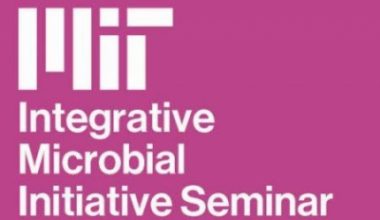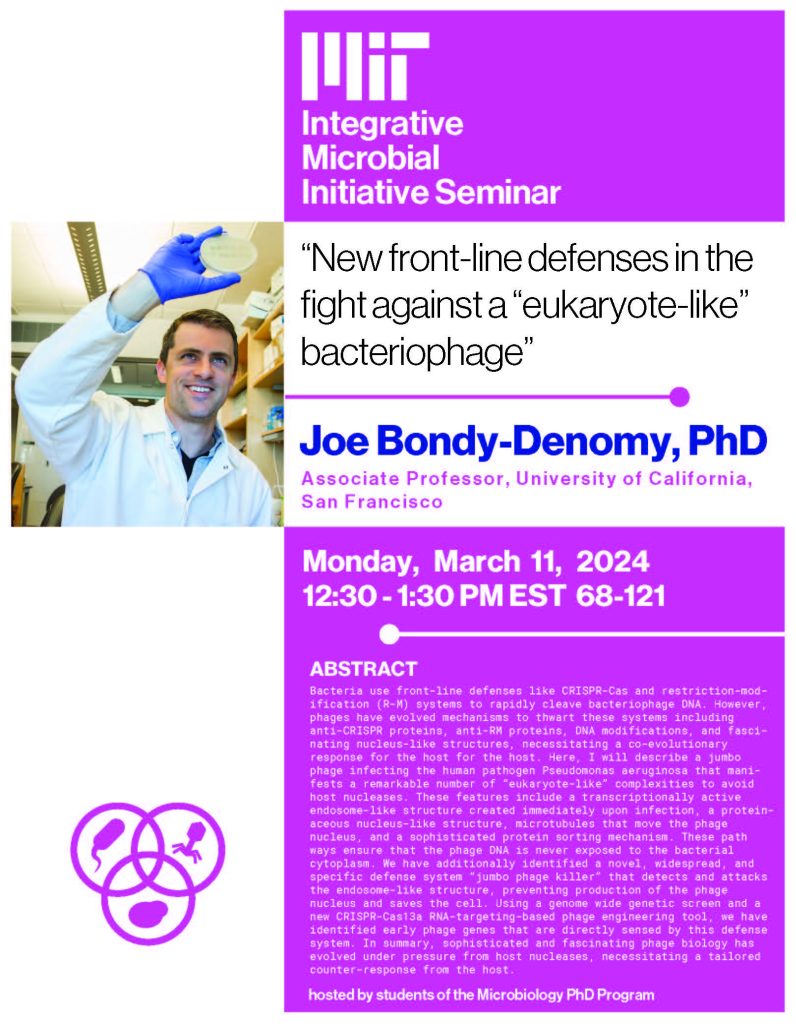

Title: “New front-line defenses in the fight against a “eukaryote-like” bacteriophage”
ABSTRACT: Bacteria use front-line defenses like CRISPR-Cas and restriction-modification (R-M) systems to rapidly cleave bacteriophage DNA. However, phages have evolved mechanisms to thwart these systems including anti-CRISPR proteins, anti-RM proteins, DNA modifications, and fascinating nucleus-like structures, necessitating a co-evolutionary response for the host for the host. Here, I will describe a jumbo phage infecting the human pathogen Pseudomonas aeruginosa that manifests a remarkable number of “eukaryote-like” complexities to avoid host nucleases. These features include a transcriptionally active endosome-like structure created immediately upon infection, a proteinaceous nucleus-like structure, microtubules that move the phage nucleus, and a sophisticated protein sorting mechanism. These pathways ensure that the phage DNA is never exposed to the bacterial cytoplasm. We have additionally identified a novel, widespread, and specific defense system “jumbo phage killer” that detects and attacks the endosome-like structure, preventing production of the phage nucleus and saves the cell. Using a genome wide genetic screen and a new CRISPR-Cas13a RNA-targeting-based phage engineering tool, we have identified early phage genes that are directly sensed by this defense system. In summary, sophisticated and fascinating phage biology has evolved under pressure from host nucleases, necessitating a tailored counter-response from the host.
BIO: Joseph Bondy-Denomy is an Associate Professor in the Department of Microbiology & Immunology at the University of California, San Francisco. The lab is focused on studying the interactions between bacteriophages and the defense systems encoded by host bacteria, specifically focused on the human pathogenPseudomonas aeruginosa. Historically, the lab has studied CRISPR-Cas systems and their inhibitors, anti-CRISPR proteins, but more recent work has broadened that interest to include unique mechanisms of CRISPR-Cas evasion, such as “phage nucleus” compartments. The lab has also begun to characterize the mechanisms of new immune systems in bacteria that inhibit phage, like Gabija, CBASS, Thoeris, Shango, and Jumbo phage killer defenses. Work in the Bondy-Denomy lab has been funded by the NIH, DARPA, the Searle Scholars Program, the Vallee Foundation, and the Innovative Genomics Institute. Dr. Bondy-Denomy serves as a reviewer for numerous granting agencies and journals, including sitting on the editorial boards for the Jounal of Bacteriology, GENETICS, and the CRISPR Journal. He is the recent recipient of the UCSF Bowes Biomedical Investigator Award, UCSF Sanghvi-Agarawal Innovation Award, and the University of Waterloo Young Alumni Award. Joe is also the co-founder of Acrigen Biosciences, a gene editing company using anti-CRISPR proteins to enable therapeutic precision and on the SAB of SNIPR Biome, Leapfrog Bio, and Excision Biotherapeutics. Prior to coming to UCSF, Joe was a PhD student with Alan Davidson at the University of Toronto and received his undergraduate degree in Biology from the University of Waterloo.